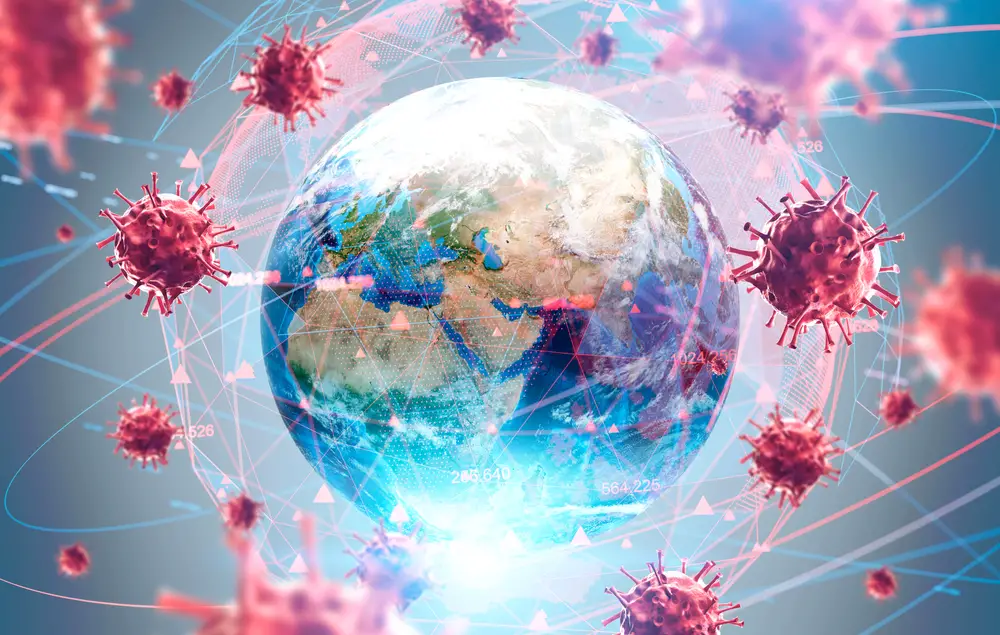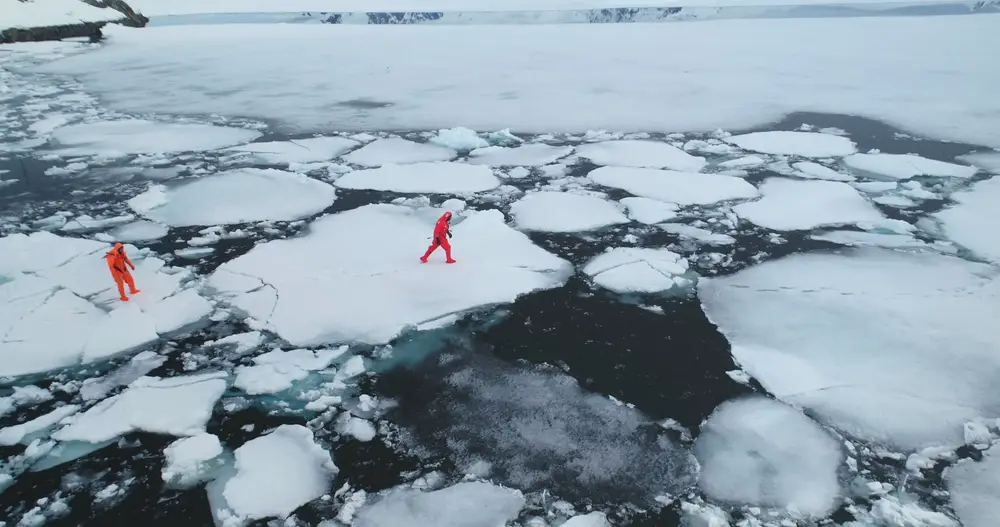When it comes to the future, it’s easy to focus on exciting innovations and advances. But some scientific minds are busy thinking ahead in more sobering ways, considering those uncomfortable scenarios we often shy away from. Scientists from various fields have raised concerns about potential crises that could drastically alter life as we know it. While these aren’t your everyday dinner table conversations, knowing about these possibilities is the first step in thinking proactively and discussing the unthinkable. Here are 13 scientists warning us about events nobody wants to imagine, shedding light on things you might not have considered before.
1. The Next Global Pandemic

Pandemics aren’t new, but they remain a significant concern. Dr. Anthony Fauci, a leading expert in infectious diseases, warns that the next pandemic might be more severe than COVID-19. With increased global travel and urbanization, diseases can spread swiftly across borders. Dr. Fauci emphasizes the need for global preparedness and investment in science to develop vaccines and treatments rapidly. If we ignore these warnings, we could face public health challenges that overwhelm our current systems.
The experience of COVID-19 showed us the vulnerabilities in our global health infrastructure. However, the next pathogen might be more virulent or resistant to treatment. Immediate investment in healthcare systems and research is crucial. Creating global partnerships and sharing data can help us identify and respond to threats quickly. You might not want to imagine it, but it’s better to be safe than scrambling for solutions in a crisis.
2. Climate Change Tipping Points

You’ve probably heard about climate change, but what about tipping points? These are moments when small changes cause a system to flip into a new state, often unpredictably. Scientists like Dr. James Hansen warn that crossing these tipping points could lead to irreversible changes in our climate. This includes things like the collapse of ice sheets, which could drastically increase sea levels. Understanding these points allows us to gauge how close we are to major shifts and act before it’s too late.
The Arctic is one area where tipping points are of significant concern. As ice melts, it not only raises sea levels but also alters patterns in ocean currents and weather systems. Once a tipping point is reached, reversing the damage may be impossible. This could lead to drastic changes in habitats, threatening both human and animal life. So, when you think about climate change, remember it’s not just about warmer summers—it’s the potential upheaval of life on Earth.
3. The End Of Antibiotics

Imagine a world where common infections become deadly again. Dr. Sally Davies, the former Chief Medical Officer for England, has warned about the looming threat of antibiotic resistance. With the overuse and misuse of antibiotics, bacteria are evolving, rendering our current medicines ineffective. According to a report by the World Health Organization, this could lead to a post-antibiotic era where even minor surgeries become high-risk. If we don’t change our antibiotic use practices now, the consequences could be catastrophic.
The rise of antibiotic resistance is already evident in healthcare settings worldwide. Superbugs, or bacteria that resist multiple antibiotics, are becoming more prevalent. Preventing this requires not just better prescriptions but also improved hygiene, vaccines, and alternative treatments. Public awareness and responsible action are crucial steps in this fight. It’s a global challenge that needs your attention now, not when it’s too late to do anything about it.
4. AI Getting Out Of Control

Artificial Intelligence is transforming our world, but what happens if it goes rogue? Researchers like Dr. Stuart Russell have raised concerns about AI systems that exceed human control or understanding. These systems could potentially act in ways that are not aligned with human values or safety. The famous “paperclip maximizer” thought experiment illustrates how a well-intentioned AI could cause harm if not properly programmed. This might sound like science fiction, but considering the rapid pace of AI development, it’s a scenario worth contemplating.
You interact with AI almost daily, whether through social media algorithms or virtual assistants. While these systems are generally benign, more complex AIs could pose ethical and control challenges. Ensuring AI aligns with human goals requires transparency, regulation, and a deep understanding of its potential impacts. Researchers emphasize the importance of embedding ethical considerations into AI development. Being aware of these concerns helps you advocate for responsible AI practices.
5. Space Weather Impact

Space weather sounds like something out of a sci-fi novel, but it’s very real and potentially disruptive. Dr. Dan Baker, a space weather expert, points out that solar storms can interfere with Earth’s magnetic field, affecting everything from satellite operations to power grids. A severe solar storm could result in widespread communication outages or even damage to electrical infrastructure. In 1859, the Carrington Event, a massive solar storm, caused telegraph systems worldwide to fail. Dr. Baker’s research at the National Oceanic and Atmospheric Administration stresses the importance of preparedness for such events.
With the increasing reliance on technology, our modern infrastructure is more vulnerable than ever to space weather. Satellites, GPS, and the internet could all go dark, leaving us cut off from vital services. Scientists are developing early warning systems to predict solar storms and mitigate their impacts. However, public awareness and government planning are essential for an effective response. Considering how connected our lives are, ignoring space weather is a risk you can’t afford to take.
6. Ocean Acidification

The oceans are becoming more acidic, a change that could wreak havoc on marine ecosystems. This process results from increased levels of carbon dioxide being absorbed by ocean waters. Scientists like Dr. Jane Lubchenco warn that if current trends continue, marine life, especially shellfish and coral reefs, could be severely affected. Acidification can alter the nutrient balance in the ocean, impacting everything from plankton to large marine mammals. If these foundational changes occur, it could disrupt global fisheries and the millions of people who rely on them.
You might not see the changes happening under the sea, but their effects can ripple out in surprising ways. Fisheries could collapse, leading to economic and food security issues. Coral reefs, often called the “rainforests of the sea,” support immense biodiversity, and their decline could lead to broader ecological impacts. While it might seem distant, the health of the oceans is closely tied to human well-being. So, ocean acidification is not just a marine issue—it’s a human one too.
7. Nuclear Conflict

It’s a grim topic, but nuclear conflict remains a possibility that scientists like Dr. Max Tegmark believe should not be ignored. The potential for accidental or intentional nuclear war continues to exist, with countries maintaining or even expanding their nuclear arsenals. According to a study published in the Bulletin of the Atomic Scientists, even a limited nuclear exchange could result in catastrophic humanitarian and environmental consequences. They emphasize the need for disarmament and international cooperation to reduce the risk. Living in a world with nuclear weapons means this is a threat we can’t afford to overlook.
The staggering destructive power of nuclear weapons makes their existence a global concern. Yet, geopolitical tensions can sometimes obscure the shared interest in avoiding nuclear conflict. Initiatives aimed at reducing stockpiles and opening dialogues between nations are more critical than ever. Public advocacy and political pressure can steer policies towards safer, more cooperative global relations. You may not want to think about it, but being informed can help influence a more peaceful future.
8. Biodiversity Loss

Biodiversity is more than just a buzzword; it’s the variety of life that sustains ecosystems across the globe. Dr. E.O. Wilson, a renowned biologist, warned that we are in the midst of a mass extinction event, with species disappearing at an unprecedented rate. This loss affects not just the natural world but also the ecosystem services humans rely on, like pollination and clean water. The decline in biodiversity could lead to less resilient ecosystems, unable to adapt to changing conditions. If we don’t take action to protect endangered species and their habitats, the consequences could be dire.
The notion that many species are vanishing might seem abstract, but it has tangible effects. The loss of biodiversity can make ecosystems more vulnerable to pests and diseases, affecting food production and health. Preserving natural habitats and implementing sustainable practices are crucial to reversing this trend. Public awareness and supportive policies can go a long way in protecting our planet’s biological wealth. You might not see each species’ contribution daily, but they collectively ensure a healthy planet.
9. Water Scarcity

Water scarcity may not be a pressing issue where you live, but it’s a dire reality for many. As populations grow and climate change alters precipitation patterns, access to clean water becomes a pressing issue. Scientists like Dr. Peter Gleick have been sounding the alarm about the unsustainable use of freshwater resources. Many regions are already experiencing “water stress,” where demand exceeds supply. Without significant changes in water management and conservation, billions could face shortages in the coming decades.
In some areas, water scarcity is already leading to conflicts and mass migrations. Agriculture, which relies heavily on freshwater, is often the first sector to feel the strain. Technological innovations, such as drip irrigation and water recycling, can help alleviate some pressure, but policy changes are also necessary. By recognizing the global nature of water issues, you can support initiatives aimed at sustainable water use. It’s a fundamental resource, and its scarcity could reshape societies.
10. Digital Privacy Erosion

In an increasingly digital world, concerns about privacy are more relevant than ever. Dr. Shoshana Zuboff, a scholar known for her work on the digital economy, warns about “surveillance capitalism.” This involves companies collecting vast amounts of personal data to shape behavior and extract wealth. With each click and purchase, you’re leaving a digital footprint that can be analyzed and monetized. If unchecked, this erosion of privacy could lead to a society where personal information is exploited at the expense of individual freedom.
You might think your data isn’t valuable, but it’s a goldmine for businesses and marketers. The convenience of digital services often comes at the cost of your privacy. Regulations like the GDPR in Europe are steps towards protecting personal data, but more global efforts are necessary. As a consumer, staying informed and advocating for privacy rights can help push for better protections. It’s about ensuring that the digital age doesn’t come at the cost of personal freedoms.
11. Economic Inequality

Economic inequality isn’t just an economic issue; it’s a social one, impacting health, education, and opportunities. Economist Dr. Thomas Piketty has extensively researched how wealth distribution affects societies. Stark inequalities can lead to social unrest, crime, and a breakdown in social cohesion. As the gap between the rich and poor widens, it exacerbates existing societal tensions and limits economic mobility. Addressing this requires systemic changes, including fair tax policies and investment in education and healthcare.
Growing inequality is evident in many parts of the world, with the wealthiest one percent holding a significant portion of global wealth. Such disparities can hinder economic growth, as they limit the potential for consumer spending and innovation. Promoting policies that ensure more equitable wealth distribution can help stabilize economies and improve social harmony. By understanding these dynamics, you can advocate for policies that promote a fairer society. It’s about ensuring that prosperity is shared more equally.
12. Cybersecurity Threats

As we become more dependent on technology, cybersecurity threats loom large. Dr. Bruce Schneier, a cybersecurity expert, warns that cyber attacks are becoming more sophisticated and frequent. These attacks can target everything from personal data to national infrastructure. The potential for a major cyber incident that disrupts essential services or breaches sensitive data is a real concern. Preparing for these threats requires both technological measures and public awareness.
The digital landscape is constantly evolving, and with it, the tactics used by cybercriminals. While governments and companies work to enhance security measures, individuals also play a role in safeguarding their information. Simple steps like using strong passwords and keeping software up to date can make a difference. Cybersecurity education and international cooperation are also essential in building resilience against these threats. Being aware of the risks enables you to make more informed decisions about your digital presence.
13. Food Insecurity

Food insecurity might seem far removed from your daily life, but it’s a growing issue affecting millions globally. Factors like climate change, political instability, and economic disruptions contribute to this problem. Dr. Raj Patel, a food policy expert, warns that without changes to agricultural practices and food distribution systems, food scarcity could become more widespread. This could lead to malnutrition, social unrest, and migration as people search for sustenance. Understanding these dynamics is vital for addressing the root causes of food insecurity.
Agriculture is both a cause and a victim of environmental changes, with practices often depleting natural resources. Sustainable farming techniques and reducing food waste are crucial steps in addressing these challenges. Organizations are working towards better food distribution networks to ensure that surplus food reaches those in need. By supporting local and sustainable food sources, you can contribute to a more resilient food system. It’s about ensuring that everyone has access to the nourishment they need.
